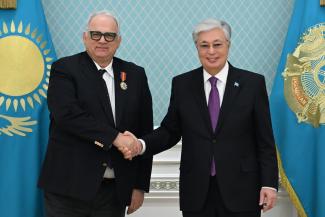Who’s In? Women's Wrestling Olympic Qualifiers
Tuesday, April 21, 2020 - 21:58 By Andrew Hipps

CORSIER-SUR-VEVEY (April 22) - In response to the IOC’s decision to postpone the Tokyo Olympic Games until the summer of 2021, United World Wrestling has announced that all Olympic qualification spots already earned will continue to be honored.
For the nations whose wrestlers qualified at the World Championships or Pan Am Qualifiers that means they are done, but for those who haven’t qualified in each weight category there will be events in March and April of 2021 to determine the remaining eight spots in each category.
We’ve broken down “Who’s In,” and which stars still need to qualify.
The top women’s wrestling nations are back at it this qualification year as Japan, China, and the lead in the race to accumulate the most Olympic qualifiers.
The United States is the lone nation with all six weight categories qualified in women's wrestling having qualified two weight categories at the 2019 World Championships and adding four more at the Pan American Olympic Qualifier in Ottawa, Canada.
Japan qualified five of the six weight categories at the World Championships, while China qualified four. Both nations are expected to fill out their Olympic licenses at the Asian Olympic qualification event in March 2021
Let's look at where things stand in each of the six weight categories heading into the final four Olympic qualifying events.

50kg
In one of the more surprising developments at the 2019 World Championships, Japan failed to qualify 50kg in women's wrestling for the Tokyo Olympics. Yuki IRIE, who earned the spot over two-time world champion Yui SUSAKI, failed to reach a medal match in Nur-Sultan.
That loss opened the door for Susaki to regain her spot and chase Olympic gold. Susaki came back to defeat Yuki at the All Japan Championships in December and the right to qualify the weight category at the Asian Olympic Qualifier. If she does, Susaki will be the immediate favorite to win the weight in Tokyo.
Evin DEMIRHAN (TUR), a world bronze medalist and U23 world champion, will be looking to qualify at the European Olympic Qualifier.

53kg
Jacarra WINCHESTER (USA) won a world title in Nur-Sultan at 55k before making the move down to 53kg for an Olympic run. She took her energy to Ottawa this March where she qualified the weight category for the United States at the Pan American Olympic Qualifier.
Two-time world champion Vanesa KALADZINSKAYA won gold at the Matteo Pellicone in January before adding a European title in February. She will be looking to secure her Olympic berth at the European Olympic Qualifier in March.

57g
Olympic champion Helen MAROULIS (USA), who stunned Japanese wrestling great Saori YOSHIDA (JPN) to win gold at the Rio Olympics, returned to competition for the first time since the 2018 World Championships at the Pan American Olympic Qualifier. She qualified the United States for the Olympics at 57kg by reaching the finals before forfeiting.
Alma Jane VALENCIA ESCOTO (MEX) made history at the Pan American Olympic Qualifier by advancing to the finals to become the first-ever Mexican woman to qualify for the Olympics in wrestling.
Three-time world medalist Emese BARKA (HUN) and 2020 European champion Grace BULLEN (NOR) will be among the favorites to qualify at the European Olympic Qualifier.

62kg
Four-time world medalist Yulia TKACH (UKR) has had a strong year, winning bronze at the Matteo Pellicone and gold at the European Championships, but is still looking to secure an Olympic berth at 62kg. She is currently ranked No.3 in the world.
Jackeline RENTERIA CASTILLO (COL) is in search of her fourth trip to the Olympics. The 34-year-old Colombian won Olympic bronze medals in 2008 and 2012. She failed to qualify at last year's World Championships and at the Pan American Olympic Qualifier. She will have one more opportunity to qualify at the World Olympic "Last Chance" Qualifier next April.

68kg
Danielle LAPPAGE (CAN), a world silver medalist in 2018, qualified for the Olympic Games in March by winning gold at the Pan American Olympic Qualifier. The Canadian star also claimed a bronze medal at the Matteo Pellicone in January.
Yudari SANCHEZ RODRIGUEZ (CUB) punched her ticket to Tokyo by reaching the finals at the Pan American Olympic Qualifier and is one of three Cuban women to qualify for the Tokyo Olympics.
Koumba LARROQUE (FRA) won world medals in 2017 and 2018, but fell short of reaching a medal match last year in Nur-Sultan. She will be looking to secure her spot in the Olympics at the European Olympic Qualifier.

76kg
Olympic champion Erica WIEBE (CAN) captured gold at the Matteo Pellicone before securing her spot in the Tokyo Olympics at the Pan American Olympic Qualifier. There will be several very accomplished women looking to qualify at the European Olympic Qualifier, including world champion Yasemin Adar (TUR), four-time world medalist Vasilisa MARZALIUK (BLR), and one of Russia's Olympic medalists, Natalia VOROBEVA or Ekaterina BUKINA.
Vorobeva is a 2012 Olympic gold medalist and 2016 runner-up. A recent mother, she won the world championships in 2019 at the non-Olympic weight of 72kg.


Share your thoughts.
Comments